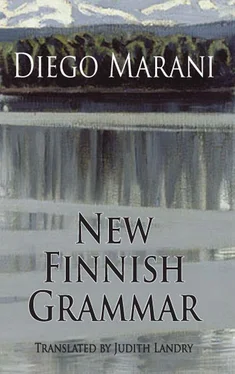I was surprised at having understood almost all that the pastor had said. The words, I mean. As far as the politics were concerned, I was in no position to pass judgement, and I knew that he was often swept away by the sheer fervour of his vision. As in an unfamiliar forest, my mind had to make its own way as it went along. Whenever I lost the pastor from sight as I followed him on his frenetic ramblings, I had always managed to regain my bearings, to catch up with him again without too much difficulty, taking other paths. By now, in the discussions that had become the staple of our time together, I had acquired a reasonable mastery of his vocabulary, using my common sense as best I could, leaning limping words up against able-bodied ones in order to move forward. As Koskela walked before me towards the centre of the church, I noted with satisfaction how stark and unadorned the proclamation was, as indeed was the place where it was hung: not a single picture, not a single ornament on the whitewashed walls: except, in the middle of the apse, one single framed canvas, a Last Judgement where God the Father, with a white beard, was descending from a sulphurous heaven to separate men into sheep and goats. To the right were the damned, already licked by the flames of Hell, and to the left the blessed, a formless multitude clad in white tunics. Now Koskela had reached the altar. He made an expansive gesture, then spoke.
‘Here no one is going to come forward to greet you; no saints, no cherubim. Here there are just black missals on the pews, and the numbers of the psalms hanging up on the walls. Our very church furnishings tell you what is important, that is, prayer. Because all in all it is the word of God which absolves or damns you. In Finnish, the word for Bible is Raamattu , that is, Grammar. Life is a set of rules. Beyond the rule lies sin, incomprehension, perdition.’
Outside, the storm was raging. The rain was beating down on the copper roof, drowning out the pastor’s words. A sinister darkness now filled the empty church.
‘At heart, we have always been Lutherans, even before we became Christians. The heroes of the Kalevala were already Lutherans in the same way that Achilles and Ulysses were already Orthodox. Ulysses practised his wiles on a sophisticated and sceptical society which was familiar with mental trickery. Väinämöinen’s mode of speech is craggy, immediate, uncomplicated, like the first blow of a chisel on rough stone. The Greek gods mingled with men, wrangled and negotiated with them. The god Ukko never comes down to earth; he judges our actions and then visits light or darkness upon us, punishment or reward. The fate of the Greeks is erratic, ironical; it makes great warriors of simple men. Its will seems to be inescapable, yet it can in fact be outmanoeuvred. The destiny that awaits the Finnish heroes is brutal, inflexible. It turns great warriors into simple shepherds who serve out their sentence until the very last.’
Koskela was becoming carried away by his own words. He had laid his clenched fists upon the altar and was now preparing to give one of his own special sermons. Lucid passion shone forth from his lean face; or was it madness? I could now longer follow what he was saying, but his expression kept me rooted to the spot, the tone of his voice commanded my attention.
‘Väinämöinen and his companions were surprised by just such a storm when they were fleeing from the land of Pohjola after having stolen the Sampo . The fury of the waves had driven them to the edges of the world. For days and days they had sailed over a sea with no horizon; now it loomed up before them from the dark mist bit by bit, at every stroke of the oar. Then they found the route home. The green line of the coast led them towards the land of Kaleva. But they did not know that the mistress of Pohjola was pursuing them on a ship rowed by a hundred oarsmen, defended by a thousand armed men. When the runoilija realized that the shadow in the midst of the sea was not just another island emerging briefly from the waves, but the ship of the mistress of Pohjola, bristling with swords and lances, he was truly afraid that his last hour had come. Equally alarmed, his companions looked in his direction, waiting for some word, for some decision. From the nearby shore, shrouded in mist, a thousand startled pheasants took to the air. All the fish in the sea took refuge in the deepest waters, where the rock is warm, and cloaked with the red seaweed which feeds the monsters who live below the earth’s crust.’
I had at last managed to begin to make some sense of the well-known tales of old Finnish mythology. Koskela became easier to understand when he opened his book of such stories. Describing the characters from the Kalevala , he would imitate their features, mime their voices. I had no time mentally to register words that I did not know, but Koskela’s face and gestures helped me to recognize the character he was talking about. I could visualize the page of the book where he was represented, and the things around him, too, took on similar colouring. As to the ships and weapons, Koskela imitated them so well that I didn’t even try to pinpoint the word which described them. I knew I would be able to track it down at a later stage, recognizing it from the pastor’s gestures.
‘His hands around the thole-pin, Väinämöinen watched the ship approach, saw the swords sparkling. Already he could hear the warriors’ cries. The old runoilija closed his eyes so that the words to be sung would come into his mind; then he rose to his feet, took a knife from his knapsack, hacked off a piece of flint and threw it into the sea, saying: “May a black rock spring up from this stone, a submerged rock which will destroy Pohjola’s ship, which will split its hull like a knife ripping through the white belly of a toad!’ Then the water seethed, the waves parted in a gigantic maelstrom, and a peak of rock surfaced like a sea monster, instantly to be hidden by the waves. Väinämöinen heaved a sigh of relief. Once again the sea, his erstwhile mother, had come to his aid. The three heroes stopped rowing and listened in silence. Creaking majestically, Pohjola’s ship sailed on, breasting the waves securely to the helmsman’s call, when suddenly a blow sent the masts crashing downwards into the sea. The timbers shattered upon the rock, the freezing water poured into her warm belly, and she sank from sight.’
The rumble of the thunder, and the blaze of lightning visible through the church’s high skylights served as a powerful backdrop to Koskela’s narrative. Important words were lost to me in the din, even as I sought to decipher them on the pastor’s lips. But then I gave myself over to watching him as he rowed through the mighty waves unleashed by Väinämöinen’s magic. I somehow sensed that in one of the many lives a shaman is vouchsafed, the pastor had been on board that ship. Perhaps it was not a legend he was telling, but a memory from his own youth.
‘Clinging to the rock, the mistress of Pohjola looked on in terror as her ship sank and her soldiers disappeared into the waves like bits of useless iron. Then she laid hold of five rusty scythes and five twisted hooks, and turned them into talons which she bound on to her hands. She collected the timbers and made them into huge wings, cut out a tail for herself from the sails, fashioned herself a pointed beak from the mizen-mast, into which she drove sharp nails. She placed a thousand archers on one wing, a thousand armed men on the other and hurled herself at Väinämöinen’s boat. Seeing the monstrous bird that was throwing itself upon him, Väinämöinen raised his eyes to the heavens and said: “Mighty Ukko, you alone can save us”. But the valorous Lemminkäinen rose to his feet, unsheathed his sword and severed the talons of the monstrous bird with a single downward stroke; then he hacked its wings into pieces, and the thousands of archers and armed men hurtled into the sea and disappeared in the black water. The mistress of Pohjola, clinging to the three heroes’ boat, flung herself upon the magic Sampo and clasped it to herself, but it slipped out of her hands and fell into the sea. She tried to regain her hold of it, but managed only to seize one of its lids. Heavy as a mountain, the Sampo sank down into the sea and shattered into a thousand pieces on the warm rock of the sea bottom, where the red seaweed grows. Suddenly the waves froze, the fish became nothing but white bones and stone birds plummeted down from a smoke-filled sky. Nothing moved. Life had disappeared from the face of the earth. The god Ukko had sucked it all back into himself. The magic Sampo had been destroyed, and darkness had once more taken possession of the earth.’
Читать дальше












